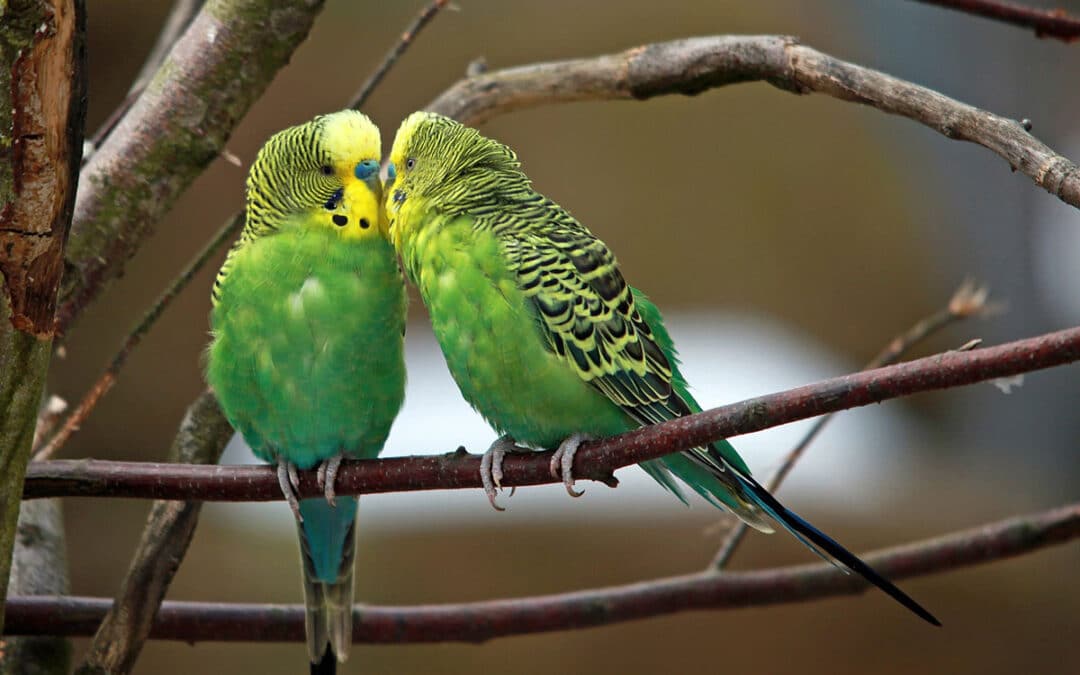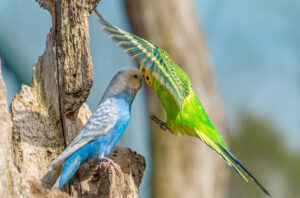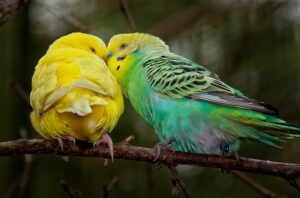While it may be tempting to only keep one budgie as a pet, having two of them is not only more fun but also healthier for the birds.
In this article, we’ll explore the reasons why having two budgies is better than one, and how to properly care for a pair of budgies.
Do Budgies Need to be in Pairs? Exploring Their Social Nature
Budgies, scientifically known as parakeets, are renowned for their vibrant colors and cheerful chirps, but their social nature is equally captivating. The question often arises: “Do budgies need to be in pairs?”.
While it’s possible to keep a single budgie as a pet, there are compelling reasons why these avian companions do better when paired up.
The Dynamics of Budgie Bonds
Budgies are inherently social creatures. In their natural habitat, these birds form tight-knit flocks that provide safety, companionship, and a network for survival. When kept as pets, replicating this social structure can have remarkable effects on their overall well-being.
While a single budgie might bond with its human caregivers, having a feathered friend of its own kind offers a level of interaction and camaraderie that humans can’t quite replicate.
The Emotional Enrichment of Budgie Buddies
Beyond the physical aspects of cohabitation, the emotional enrichment that budgies gain from having a companion is immeasurable. Loneliness can lead to boredom and stress, triggering negative behaviors like feather plucking or self-mutilation.
When paired with another budgie, these emotional stressors are alleviated through shared preening, playful interactions, and mutual companionship.

The presence of a fellow budgie provides a sense of security and belonging that contributes to their mental and emotional stability.
Unveiling the Physical Benefits
Just as we need exercise to maintain our physical health, budgies also benefit from active engagement. Do budgies need to be in pairs for physical well-being? Absolutely.
Two budgies in a shared environment engage in natural behaviors like flying together, exploring their surroundings, and playing games unique to their species. This playful interaction not only keeps them physically fit but also contributes to the overall health of their feathers, promoting vibrant colors and excellent plumage.
Solving the Boredom Puzzle
Imagine spending hours alone without social interaction or mental stimulation. For budgies, boredom can lead to a range of behavioral issues.
When kept as a pair, these birds constantly engage each other with playful antics, intriguing chirps, and collaborative exploration.
The mental stimulation gained from having a companion prevents boredom, reduces stress, and curbs destructive behaviors that can arise from a lack of engagement.

Creating a Budgie Haven: Pair-Friendly Environment
If you’re considering having two budgies, it’s essential to provide a suitable habitat that encourages their natural behaviors.
A spacious cage with plenty of perches, toys, and various food options keeps their minds and bodies active.
Adequate lighting and a comfortable room temperature ensure their comfort and well-being.
When setting up their space, remember that the right environment is crucial for nurturing their bond and supporting their overall health.
In the end, the question of “do budgies need to be in pairs?” is answered by understanding their innate social tendencies and the array of benefits that come from companionship.
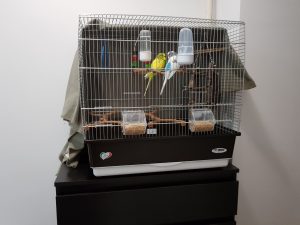
While individual circumstances can vary, the evidence overwhelmingly supports the idea that budgies thrive, both physically and emotionally, when they have a feathered friend by their side.
So, whether you’re a seasoned budgie enthusiast or a prospective pet owner, considering a pair of budgies could be the key to unlocking a world of joy, vibrant interaction, and harmonious chirps in your home.
The Social Needs of Budgies
Budgies are highly social animals that need the companionship of other birds to thrive. In the wild, they live in large flocks, and their social behavior is essential for their survival.

In captivity, having a companion can provide them with emotional and mental stimulation, reducing the chances of developing behavioral issues such as feather plucking or self-mutilation.
The Physical Benefits of Having Two Budgies
Having two budgies also provides physical benefits for the birds. They will have someone to preen and groom with, which helps to keep their feathers healthy and in good condition. They will also have a partner to exercise and play with, which is important for their physical well-being. Additionally, having two budgies will make them feel more secure and safe, reducing their stress levels and promoting overall good health.
Caring for a Pair of Budgies
Caring for a pair of budgies is not much different than caring for one, but it’s essential to provide them with a larger cage, at least 24x24x24 inches (~60x60x60cm), to ensure they have enough space to move and play.
Additionally, it’s essential to provide them with plenty of toys, perches, and a variety of food options to keep them entertained and stimulated.
It’s also essential to provide them with proper lighting, and to keep the temperature of the room comfortable for the birds.
The benefits of having two budgies instead of one
- Social interaction: Having two budgies allows them to interact with each other and engage in natural behaviors such as preening and grooming, which can reduce stress and promote overall well-being.
- Emotional support: Having a companion can provide emotional support and reduce the chances of developing behavioral issues such as feather plucking or self-mutilation.
- Physical exercise: Having two budgies allows them to exercise and play with each other, which is important for their physical well-being.
- Mental stimulation: Having two budgies provides mental stimulation and keeps them entertained and engaged, which can prevent boredom and behavioral issues.
- Better company: Having two budgies ensures that they are never alone and they will always have a companion to interact with, which can make them feel more secure and safe.
Pros of Having Two Budgies:
Pairing up budgies offers a multitude of benefits:
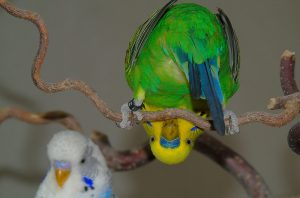
- Enhanced Companionship: Budgies thrive on social interaction, and having a feathered companion fulfills their need for constant companionship.
- Emotional Enrichment: With a companion, budgies engage in mutual preening and playful interactions, reducing stress and promoting emotional well-being.
- Physical Activity: Having a partner encourages active play, flight, and exploration, keeping them physically fit and mentally engaged.
- Behavioral Harmony: A companion budgie can serve as a role model, helping to maintain balanced behaviors and reducing instances of stress-related issues.
- Natural Social Structure: In a pair, budgies replicate their natural flock dynamic, fostering a sense of security and promoting a happier environment.
Considerations of Having Two Budgies:
While the benefits are evident, it’s important to be aware of potential considerations:
- Compatibility: Introducing budgies requires careful monitoring to ensure they get along well and avoid conflicts.
- Increased Responsibility: Caring for two budgies demands double the time and effort, including cage maintenance, feeding, and health monitoring.
- Health Management: If one budgie falls ill, there’s a chance the other could be affected, requiring prompt attention and care.
- Noise Level: Two budgies might be more vocal, which could be a consideration if you have noise-sensitive neighbors or living in close quarters.
- Individual Attention: While they bond with each other, ensuring they also receive sufficient human interaction and socialization is important.
In conclusion, having two budgies is not only more fun but also healthier for the birds. They provide emotional and mental stimulation and reduce the chances of developing behavioral issues.
Budgies also provide physical benefits for the birds, such as keeping feathers healthy and promoting overall good health.
By providing your budgies with a comfortable and safe environment, proper care, and plenty of toys, perches and food, you can ensure that your feathered friends live a long and happy life.

